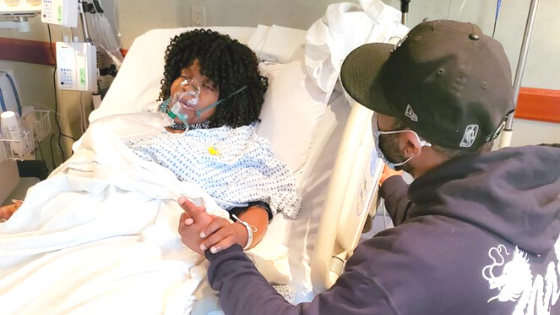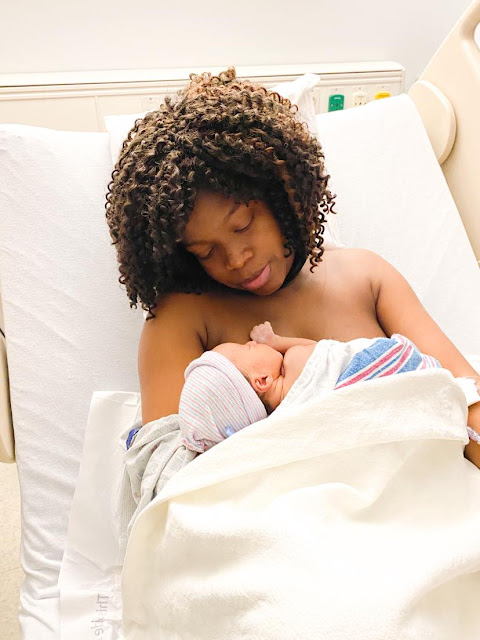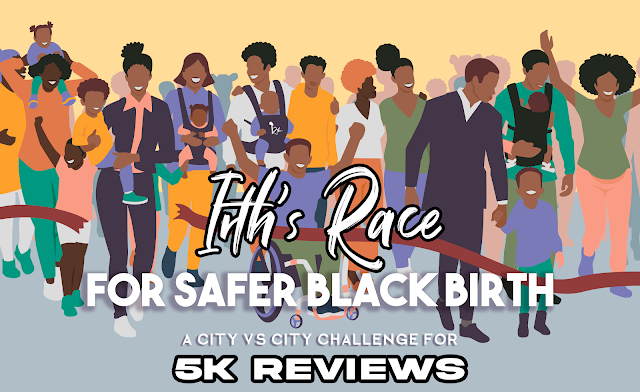When I reflect on my labor and delivery experience last spring, I have often sat with feeling cheated and ignored in many ways. We have a happy & healthy daughter because God has always been by our side, and we are blessed. Yet can you believe that not one person had followed up with my care well into being four months postpartum? And that's after being induced at 38 weeks for a sudden onset of preeclampsia and then later returning to the hospital to battle sepsis amid a global pandemic, with a ten-day-old newborn.
Though genuinely disheartened by the statistics, my husband, family, and I are not shocked that the United States faces a Black maternal health crisis, considering the level of negligence and disrespect we faced bringing our rainbow baby into the world. According to the World Health Organization, approximately 810 women die every day from preventable causes related to pregnancy and childbirth. In addition, an estimated 6700 newborns die every day, accounting for 47% of all deaths of children under the age of 5. Black, brown, and indigenous birthing people are three times more likely to die of pregnancy-related causes than their white counterparts, and right here in NYC that goes up drastically to 8 to 12 times more likely.
Irth, as in the word Birth but without the B for bias, is the first-of-its-kind review and rating app and community for Black birthing people to leave and search reviews of Ob/GYNs, birthing hospita1ls, and pediatricians. The detailed review questions in the app are then turned into quantitative data to provide hyper-local, community-centered feedback to hospitals and providers to make Black births safer, more respectful, and equitable.
The free app, available now in the Google Play and Apple app stores, also accepts reviews from fathers, birthing partners, doulas, and hospital-based midwives. Irth was recently included in the press release of commitments for Vice President Kamala Harris’ first-ever White House Maternal Health Day of Action for its national partnership with the March of Dimes’ MaternalCARE work with the Department of Health and Human Services.
Black families in New York City, Detroit, Chicago, New Orleans, Sacramento, Los Angeles, the Metro Washington D.C. area, and Atlanta face the highest Black maternal and infant mortality rates. These cities are being encouraged to win the national 'Race to Safer Black Births' challenge by leaving reviews of prenatal, birthing, or pediatric care experiences to inform and protect other expecting or new parents, to drive more transparency and accountability in the medical system.
City captains for New York City, Detroit, Philadelphia, Pittsburgh, and Atlanta will lead a national media and social media campaign to help their city make Black birthing history by being the first to reach 5,000 reviews for their city. Users can follow the leaderboard in the Irth app to see which city is taking the lead. The Challenge is featured in the Apple App Store for Black History Month, along with a profile on Irth's founder, Kimberly Seals Allers.
Personally, I have found empowerment in sharing parts of our story because our daughter Zoie and I are both still alive. I was reminded by a birth advocate that accountability doesn't solely look like medical lawsuits and that with my social media platforms I could use my voice for change. In between my daughter's naps, I'd found myself researching what was happening to Black mothers in this country, and familiarizing myself with the organizations working to combat the disparities and bias in our healthcare system.
If you know me, you know that I genuinely believe in the power of social media and how it brings people together. After Kimberly spotted a comment I made on the Crohns and Colitis Foundation page regarding the bias I've received from medical professionals who were treating my chronic illness, we ended up connecting over on Instagram. We later met in person at an amazing Doula expo, hosted by our mutual friend Latham Thomas of Mamaglow at the end of 2021.
Having found purpose through pain, I'm honored to be working alongside Kimberly's Irth team on community engagement and events. I was beyond hyped to throw on my event production hat to put together an honorary brunch celebrating advocates, and NYC doulas (including ours, Tiffani Greenaway of Kismet, and Kemet) for the launch of the Irth Doula Ambassador program.
"Our collective experiences have power," says Seals Allers, maternal health strategist, founder of Irth, and host of the Birthright podcast. "Together, we can inform and protect each other, drive transparency and accountability in the medical system, and create new data to better inform our maternity and infant care," adds Seals Allers, a former senior editor at Essence and author of five books.
Thankfully not every mother's pregnancy and birth story results in poor treatment or loss of life and we should share stories of Black birth joy because those deserve to be honored! If you've had a beautiful prenatal, birthing, postnatal and pediatric experience, share those reviews in the app too, so that Black and Brown mamas know where they can go to receive excellent care!
Have you delivered a baby in the last two to three years? What was your experience? Please leave your review on the Irth App today!






No comments:
Post a Comment